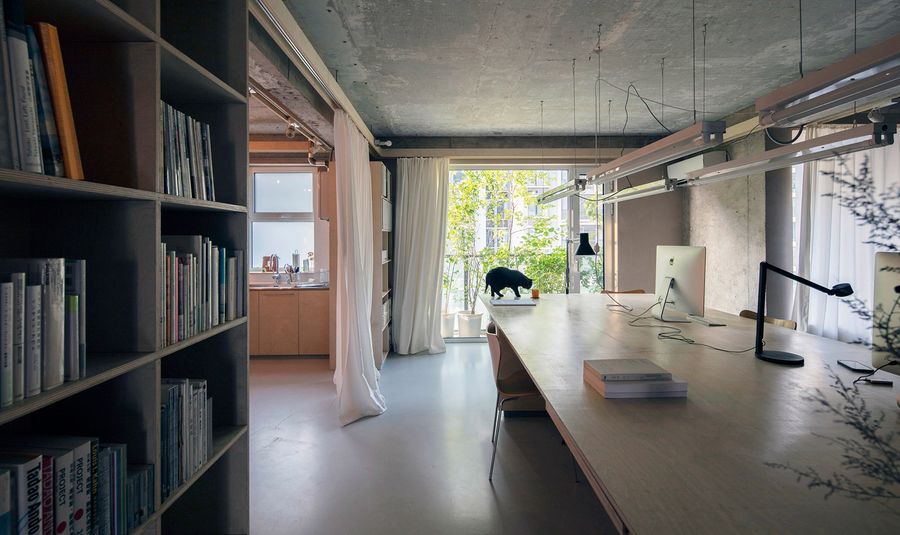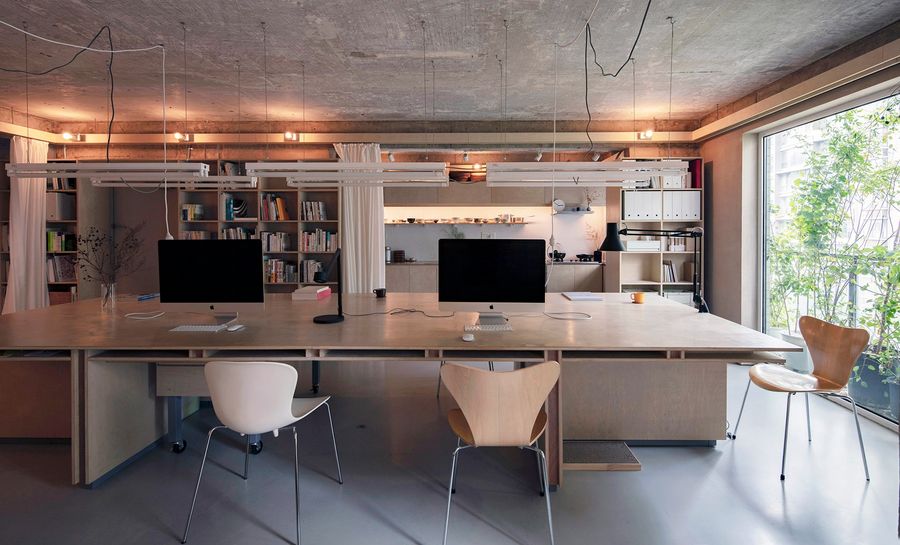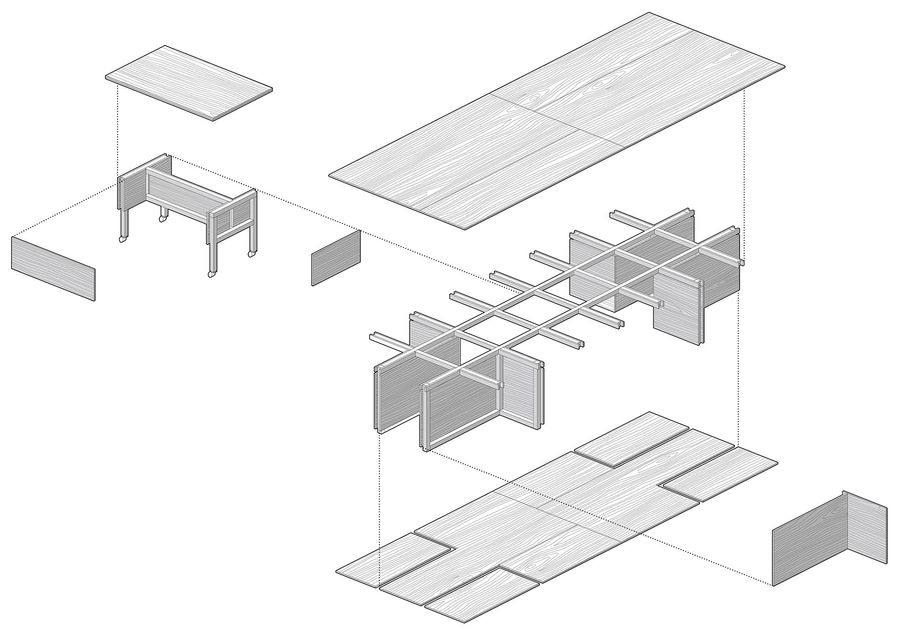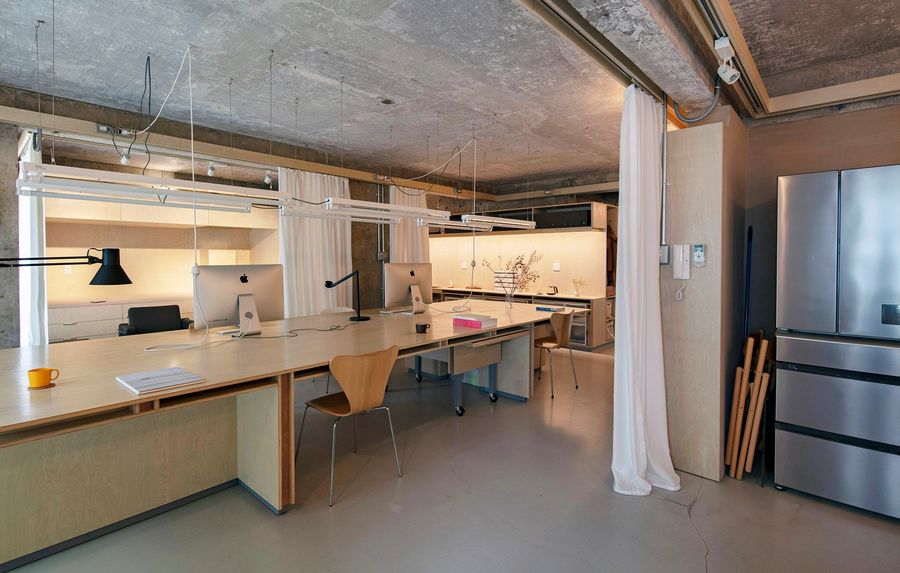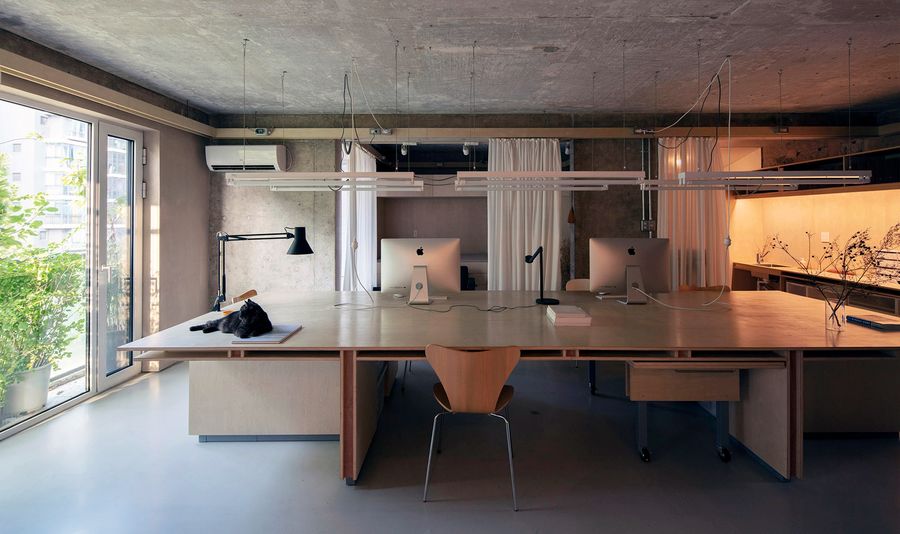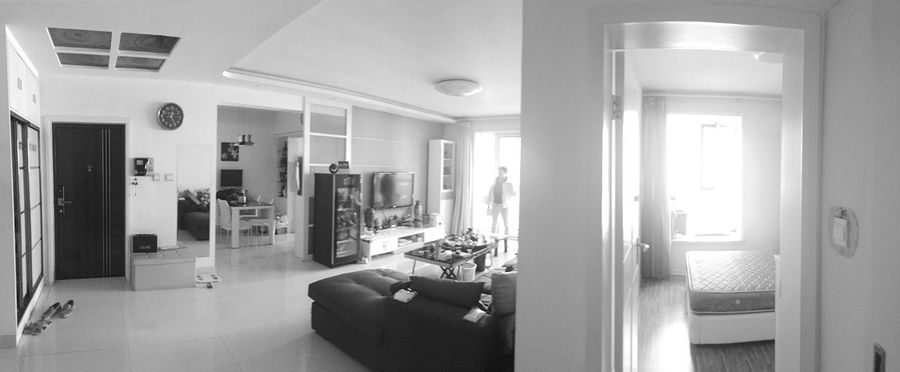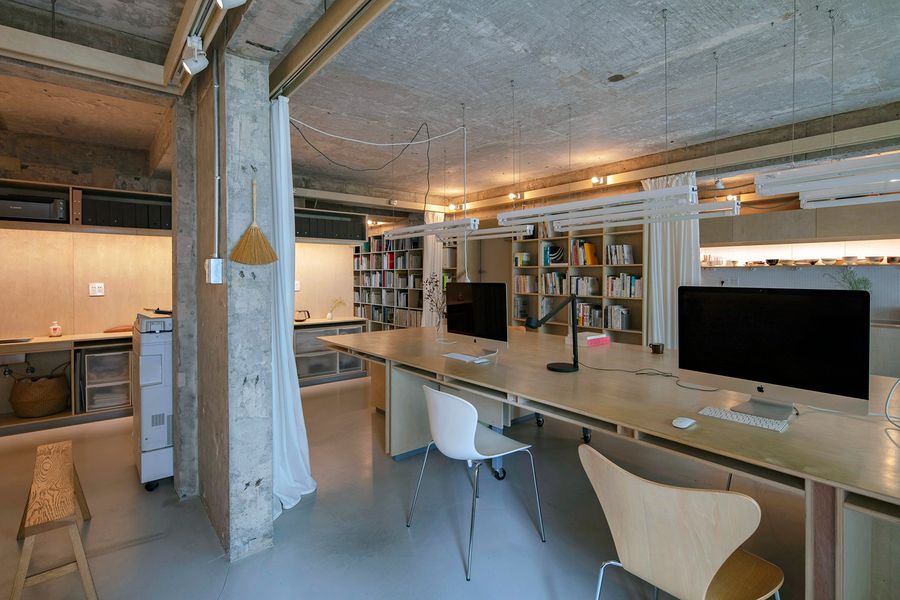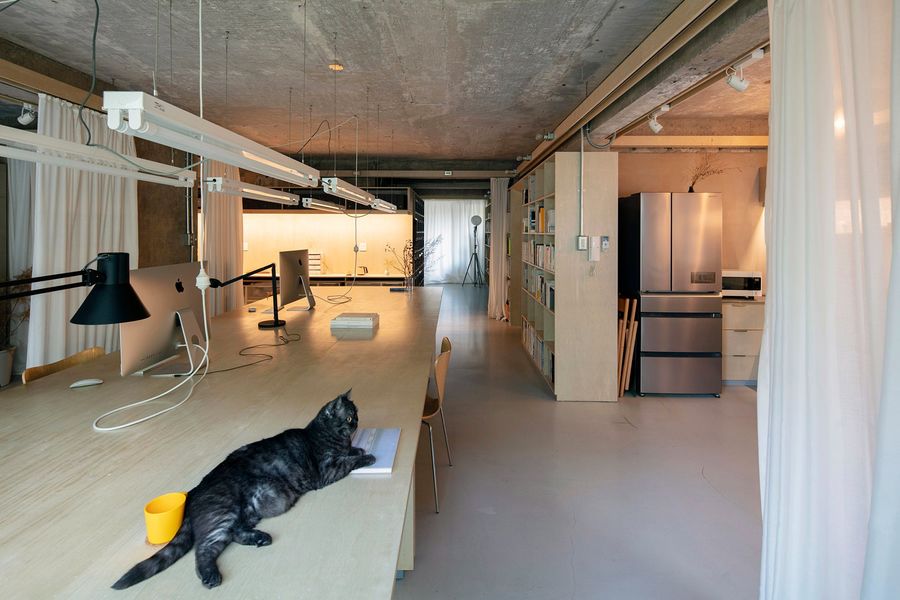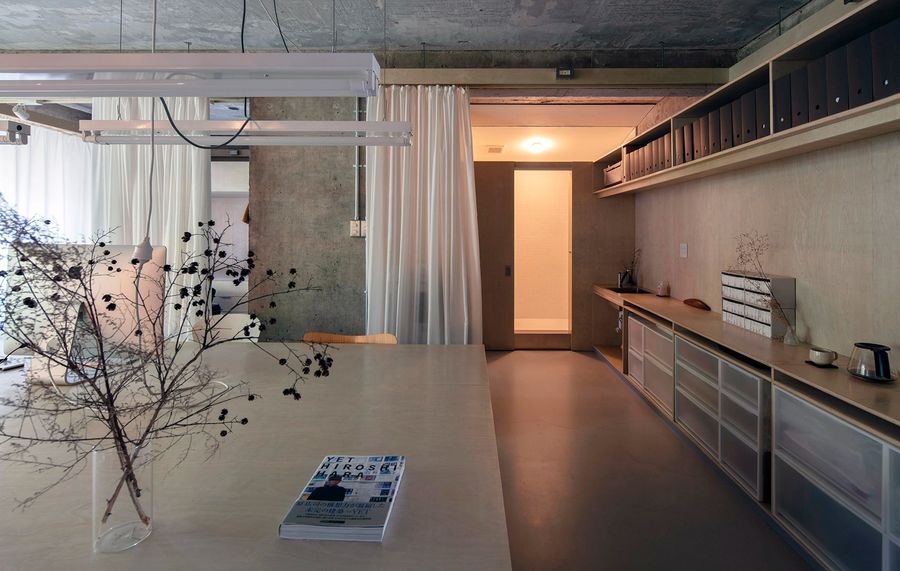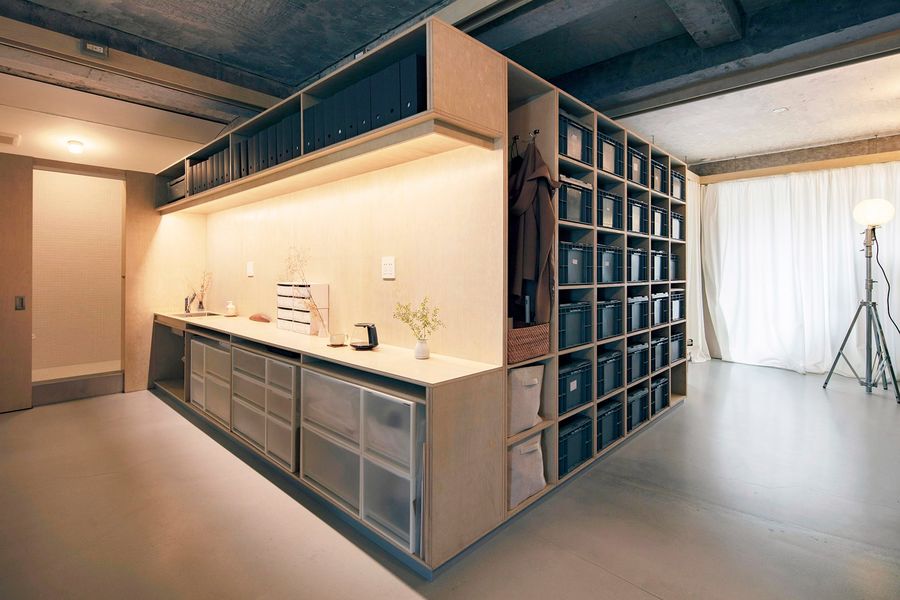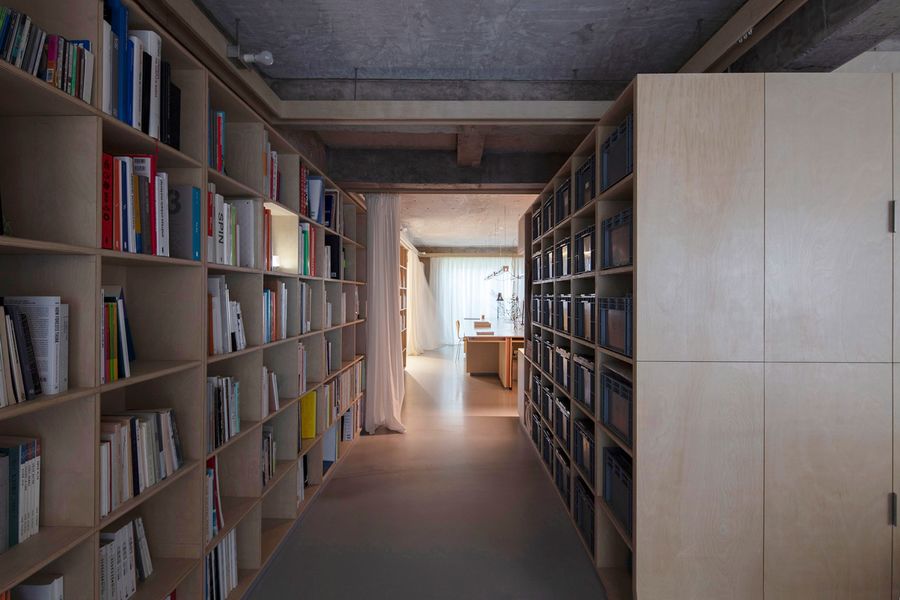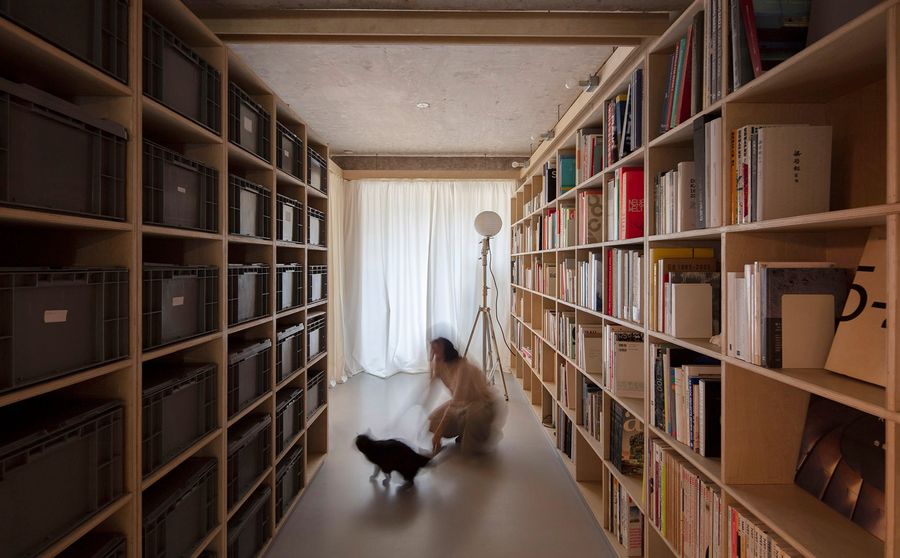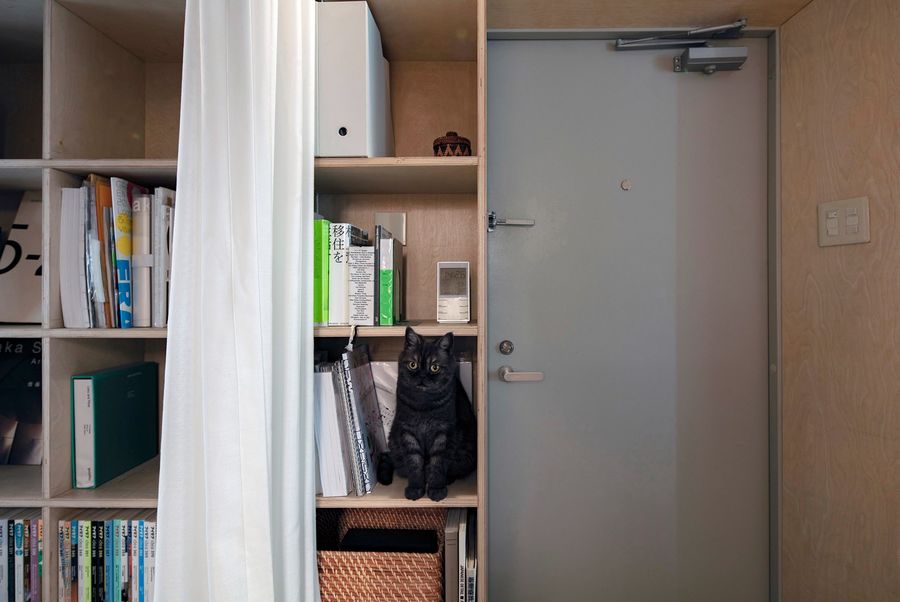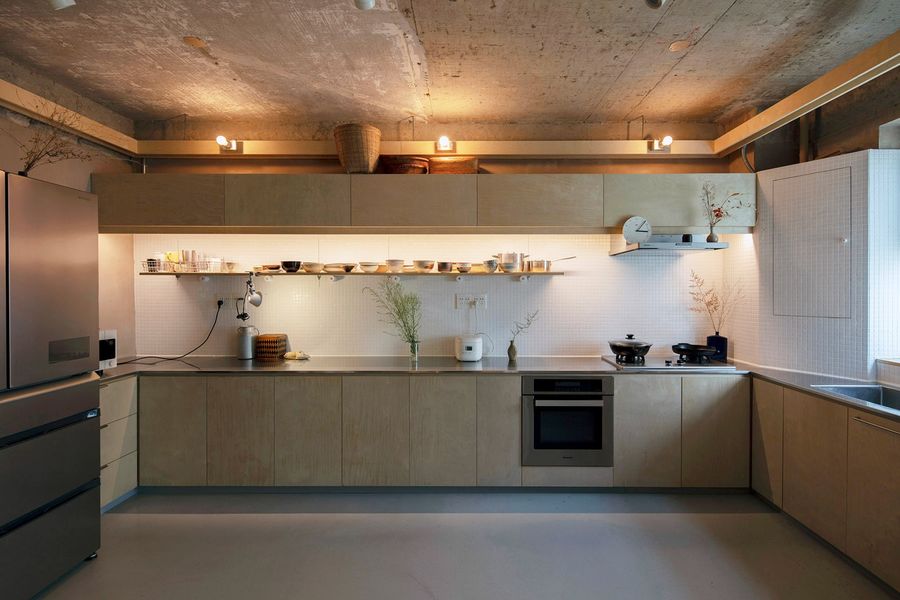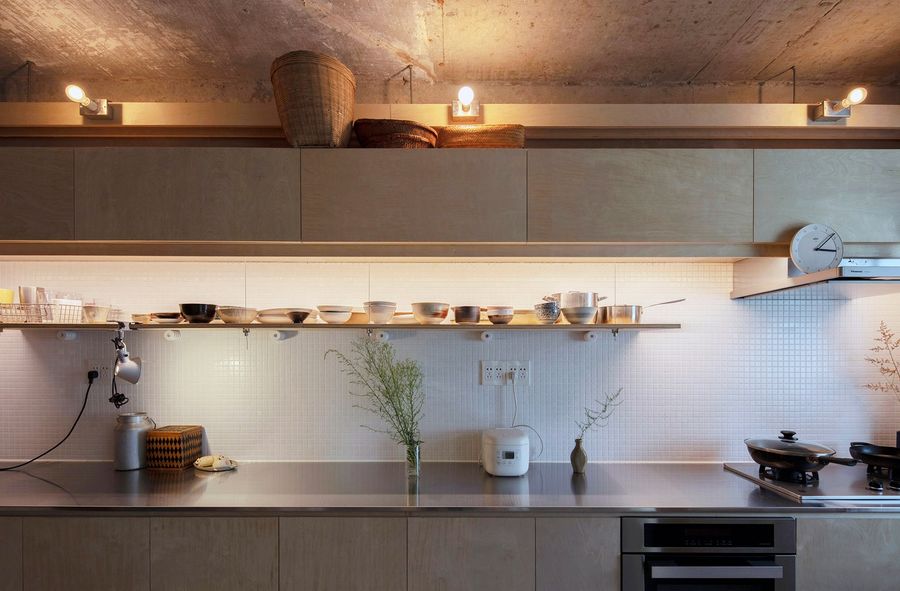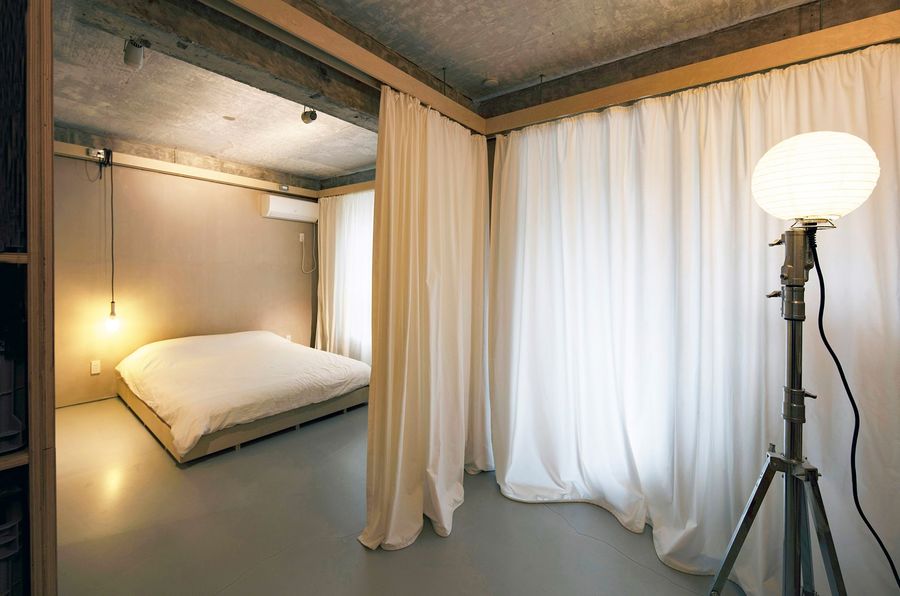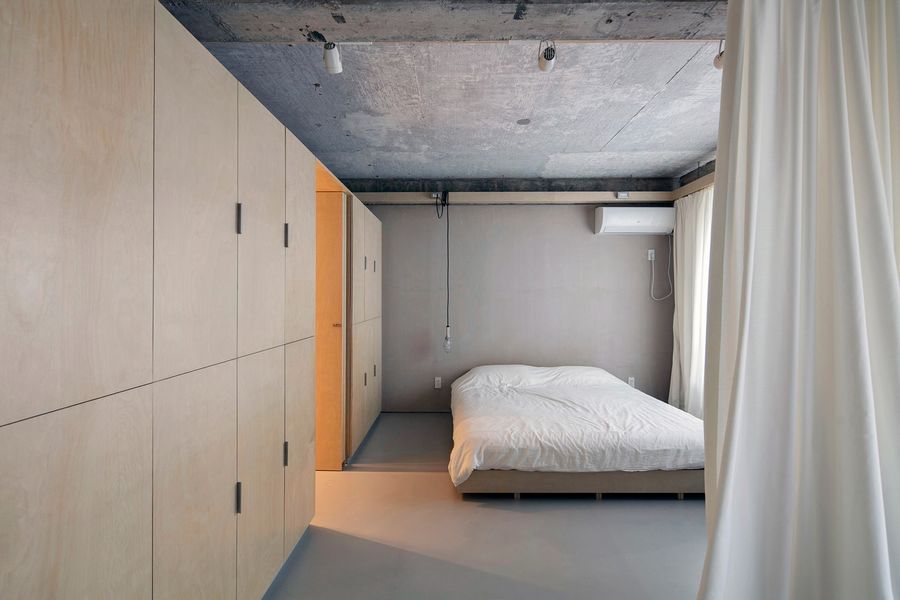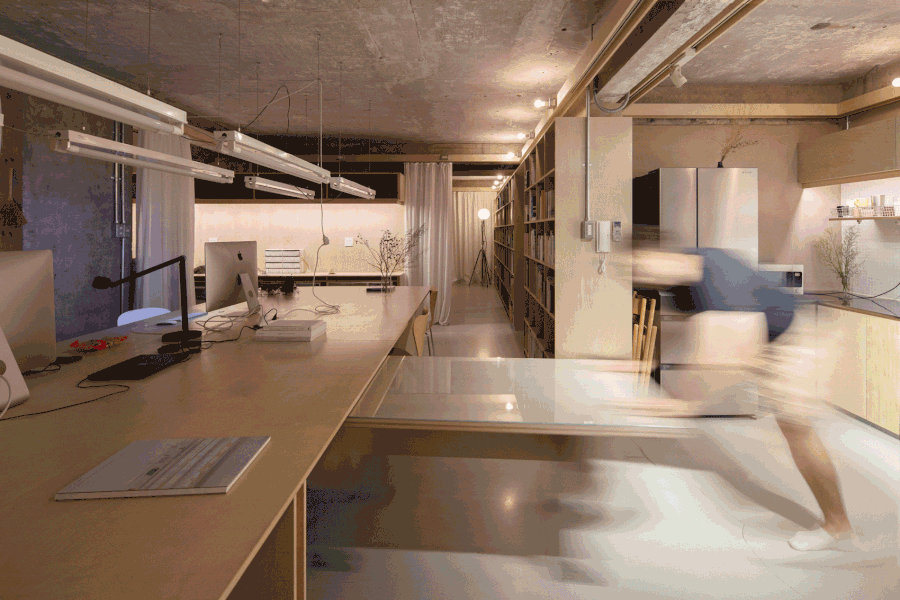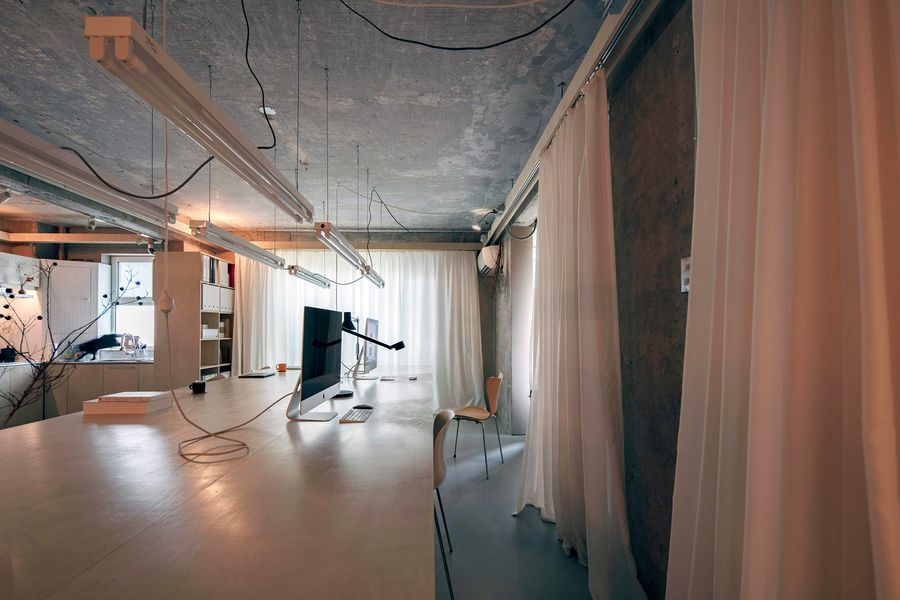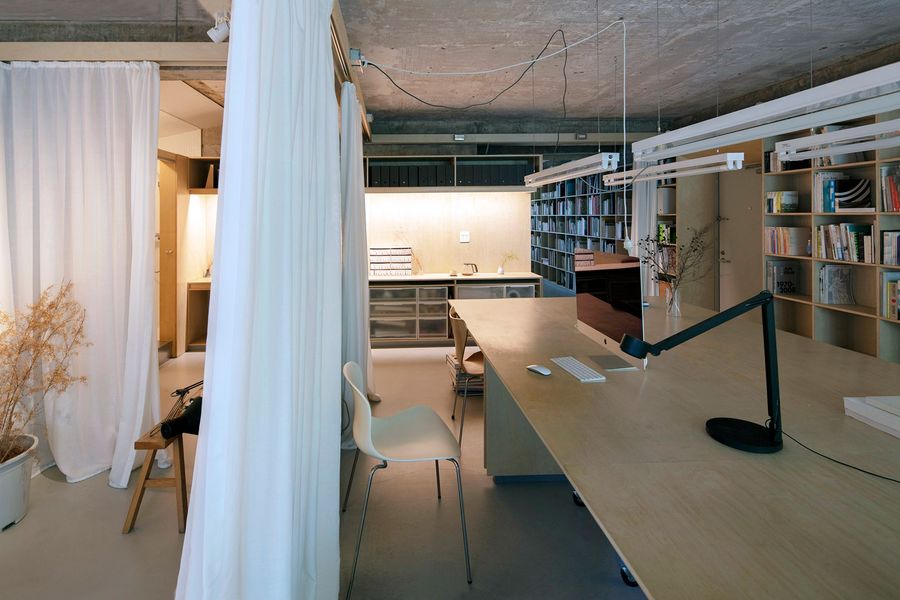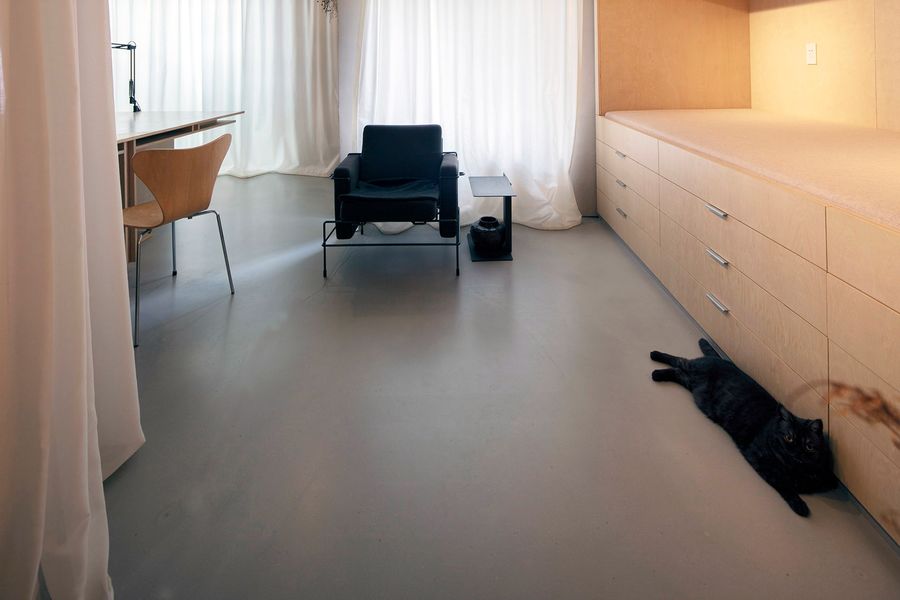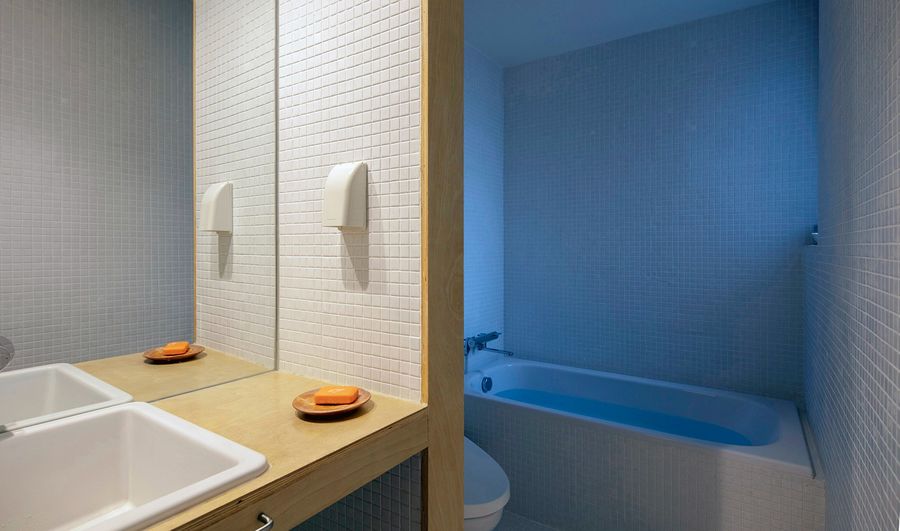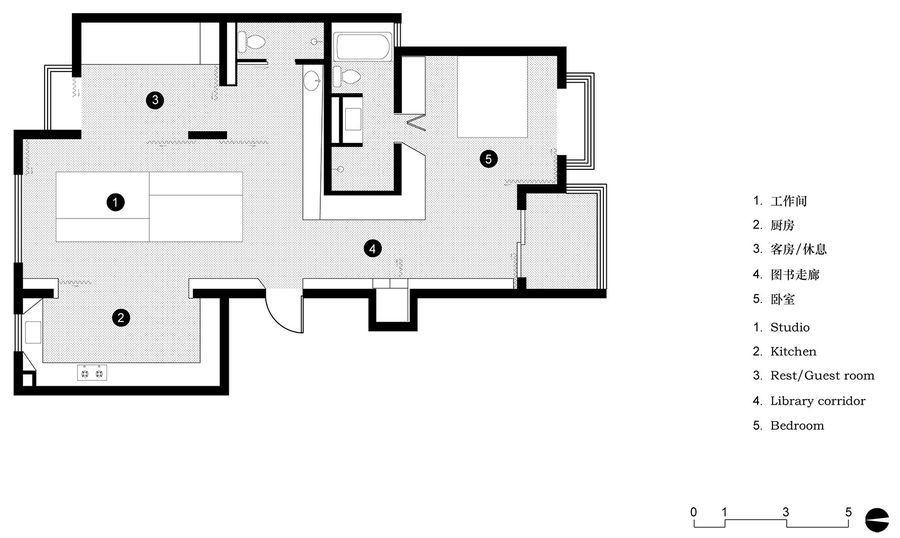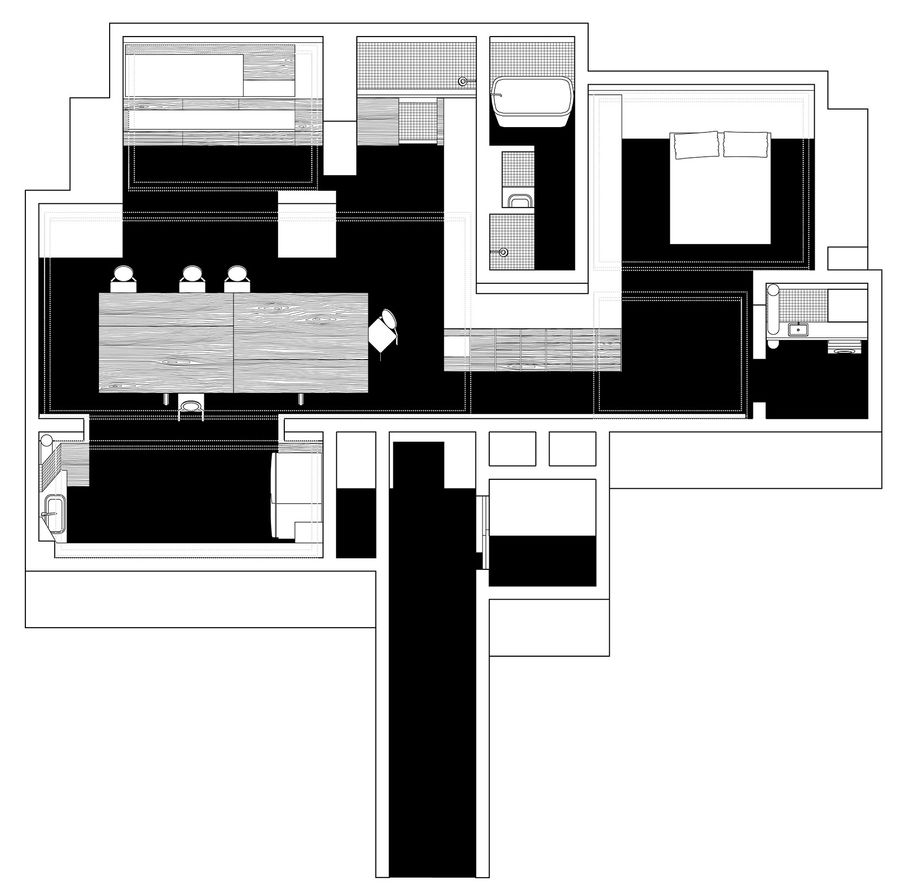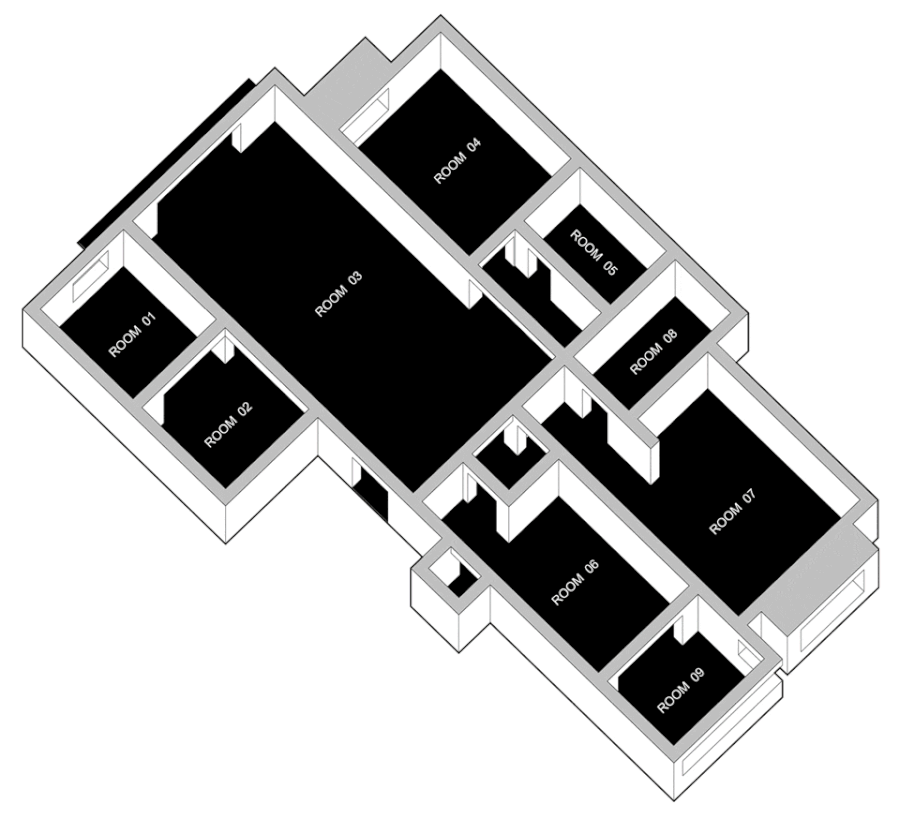逃离大城市
Escape from the metropolis
业主是一对平面设计师夫妇。因为不愿承担北京高昂的生活成本,又厌倦于严重的大城市顽疾,所以选择回到故乡,济南这样的二线城市生活。我们聊到这个房子的时候,还是在疫情爆发之前,那时候男主人说,我们忙起来也是国内国外的跑,只要交通方便无所谓在哪里定下来。这个房子既是我们的办公室,也是我们的家。
The clients are a young couple, both of whom are designers. They grew tired of the plethora of urban issues which plague Beijing, much like any other major metropolis around the world. They decided to move to Jinan, a secondary city in China, which offered more space and a lower cost of living. Our first meeting together occurred before the approaching era of the pandemic, and the husband told me that for them it was not important to be based in any particular city as their work required them to travel often both domestically and abroad. Their new house would become both their home and office.
▼室内空间概览,Overview of the interior space ©成直
谁知道,项目施工之前疫情爆发。这个在小居室内企图改变空间类型的改造,发挥了预料之外的作用。
Who knew that an epidemic would break out before the the beginning of construction. With this new reality in mind, our attempt to change the type of space in a small apartment played an unanticipated role in the renovation.
▼办公空间概览,Overview of the working space ©成直
巨案
The grand table
因为平面设计师的工作特点,我们设想构筑一个有创造力的环境。它应该具备某种特征,尽量减少环境对人们身体的限制,允许多样事件发生。而重中之重,新的空间应该提供一张大桌子,主人可以在上面完成大部分的设计师工作。我们最后因应桌面板材的模数,确定了桌子的大小:三张1.2米x2.4米的胶合板,拼成一张1.8米x4.8米的巨案。
▼巨案结构分析,Analysis diagram of the grand table ©察社办公室
Because of the nature of the clients work as designers, we envisioned the construction of a creative environment that contained certain characteristics that minimized the physical constraints of said environment and allowed for a variety of events to occur. Most importantly, we planned for a grand table within the new space, which would provide a place for a variety of different home and work activities. The size of the table is dictated by the standard modularized size of the materials used. 3 plywood boards with dimensions of 1.2 x 2.4 meters would be combined to create a massive 1.8 x 4.8 table.
▼由巨案主导的办公空间,The grand table dominates the working area ©成直
秩序的重塑
The reformation of the discipline
我们涵待改造的现场,是一个很普通的公寓楼套间,房子大概建于20世纪初。标准的三室一厅一厨两卫。空间被分割成若干较小的单元。这种空间秩序的塑造,就像这个国家中绝大多数家庭空间,来自17世纪的荷兰,以及20世纪的苏联。对应着绝大多数劳动者及中产阶级的家庭生活。这些家庭往往维系着多名家庭成员,甚至老少三代。但这显然与主人夫妇比较独特的诉求不一致,也无法容纳那张“巨案”。
The site was originally a standard apartment unit consisting of 3 bedrooms, a common living room, a kitchen, and two bathrooms located in a residential building which was built in 2006. The entire space was divided into several small rooms. The spatial condition and logic behind this original condition stemmed from 17th century Dutch and 20th century Soviet thinking. It met the requirements of most modern urban residents, in particular for middle class families with multiple members and sometimes even multiple generations. However, this collection of small rooms would not fit with our clients’ needs, and could also not accommodate the massive table.
▼改造前的房屋,The house before the renovation ©成直
好在原建筑结构体系为短肢剪力墙。这也就意味着,除了参加结构计算的剪力墙钢筋混凝土短肢,其他填充墙体均可拆除。当我们拜访清理过后的现场,发现公寓楼仿佛变成山体,三室一厅的居室变成硕大的山洞。
Fortunately, the building structure is comprised of a system of supporting short-limb reinforced concrete shear walls, and all non-structural interior walls could be removed. When visiting the site just after completing the demolition of the existing apartment, we found that it had transformed into a cave, and the building itself became a mountain.
▼拆除清理后的现场,The site just after demolition ©成直
这让我想起了HBO系列剧集“权力的游戏”中的一幕,塔格利安家族的祖庭,龙石岛上有个巨大的会议室,悬崖之上,一个包裹着巨案的山洞:画桌之厅(Chamber of the painted table)宽广的空间和单向的采光,为场所带来某种静谧,令人专注,又自在。
This brings me to a scene from the television series “Game of Thrones”, where on a cliff on “Dragon Stone Island” the ancestral court of the “House of Targaryen” appeared a cave like meeting room within which was a huge table; the so called “Chamber of the painted table”. The large scale of both room and table, and the sky lights emanating from a single direction, together provide a space with a special series of characteristics – Quiet, focused, and at moments relaxed.
▼通透的室内空间,An airy and spacious interior ©成直
回到我们的现场,消除墙壁这是第一步,其次,整个设计策略变成干脆塑造一个没有分隔的空间。这个空间逻辑的变化意味着,第一,各自分离的小空间合并成一个连续的整体,房间的尺度感增大数倍。第二,被锁在墙壁两侧的光明和幽暗,转化成连续的亮度和阴影。第三,被分别赋权的使用者,重新生活在了一起。
Back to our site, demolishing walls was the first step, and then, our strategy was to create a space which totally lacked them. The spatial transformation led to several consequences, firstly, the separate collection of small rooms was combined into a single entity, and the scale of the space increased dramatically. Secondly, the restriction of light and shadows caused by walls was transformed into something more continuous and gradual. At last, the inhabitants who have been empowered separately by walls now live together again.
▼一个没有分隔的空间,A space with no partition ©成直
占据山洞
Occupying the cave
空间的转变,依然携带过去的痕迹。不可消除的阻碍,除了短肢剪力墙,还有管道井。这就决定了卫生间的大致位置不会发生变化。我们扩大原卫生间的区域,并用一系列搁架和柜子包裹。
After the demolition was complete, there remained many traces and vestiges of the past. Besides short structural walls, the existing plumbing, heating, and electrical facilities and their related core infrastructure could not be moved. This dictated that the general location of both bathrooms would not change. We enlarged the original master bathroom and wrapped it in a series of shelves and cabinets.
▼由巨案看向洗手间入口,A view from the grand table to the entrance of the bathroom ©成直
这个巨大的装置替代墙壁,变成连续空间中若有似无的分隔物。分隔物的位置靠近主入口,自然把工作区域和卧室分开。他们之间由一条窄窄的走廊连接。就像硕大洞穴中的一条幽深通道。而大空间中不可消除的剪力墙短肢,也变成象征性的边界。
Instead of walls, the huge device generated ultimately functions as a separator. Beginning near the main entrance, it naturally divides the space into two parts, public and private. A narrow corridor enclosed by bookshelves links them together. The corridor appears like a narrow dark passage in an ever expanding cave. Those structural walls standing in the middle of the space became hidden boundaries.
▼巨大的分隔物,A huge storage device function as a separator ©成直
▼走廊处的储物架,The storage shelf at the corridor ©成直
▼储物架近景,Close shot of the storage shelf ©成直
扩大的厨房,隐藏的客房和容纳巨案的大厅模糊的连接在一起。不同功能区域之间均利用幕帘系统作为移动分隔物。
The expanded kitchen, versatile guest room, and chamber with grand table blurred together, and a series of semi-transparent curtains functioned as tangible, adjustable boundaries between these disparate areas.
▼厨房空间概览,Overview of the kitchen ©成直
▼料理台近景,Close shot of the kitchen counter ©成直
一切为了节省
All about saving budget
这个改造项目的预算只有20万人民币,单方造价不到2000元。因此我们选择尽量减少施工项目。把钱花在刀刃上。绝大多数使用功能依托于板材现场加工的固定家具。除了“巨案”,大量的书架和置物架,包括厨卫家具,床和一个多功能双层榻。“巨案”尺度过大无法让人们面对面就餐, 我们又设计了一个小餐桌,平常藏在“巨案”下面,需要的时候可以拖出来。所有木工家具主材为相较便宜的桦木多层板。
The construction budget was set at only 200,000 RMB for the entire renovation of this 130 m2 apartment, and so we needed to minimize construction projects and place focus on the most important issues. A majority of the construction would utilize on-site carpentry using plywood as a key material, for things like the table, bookshelves, a bed, kitchen cabinets, various furniture in the bathrooms, as well as a multi-functional double layer bed in the “guest room”. The grand table is so large that it is not suitable for dining, and so an additional, shorter sliding table incorporating wheels was added with the ability to be slid underneath its larger counterpart. We decided to use inexpensive birch plywood as both the structural material and final finish for all of these components.
▼卧室入口,The entrance of the bedroom ©成直
▼卧室空间概览,Overview of the bedroom ©成直
▼隐藏在巨案下的小餐桌,The sliding dining table under the grand table ©成直
清理出的混凝土楼板天花和结构短墙,刮掉腻子后呈现出特殊的质感,真实而粗粝。和邻居间不可拆除的砌块墙体脆弱掉渣,我们用基层石膏直接涂抹作为完成面。重新分配调整的电路不在暗藏隐蔽,而直接暴露出来明走。
The existing concrete ceiling and structural walls were stripped of their previously applied finishings, which revealed a very unique, authentic and coarse texture as it was impossible to clean them completely. Other walls between our site and the neighboring apartments were constructed out of concrete aerated blocks, which as a material is fragile. An additional layer of gypsum plaster was used to conceal and protect these block walls. The electrical circuitry was redistributed and no longer concealed, but rather directly exposed as part of the visual environment.
▼从清水混凝土天花暴露出来的电线,The electrical circuitry drops from the concrete ceiling ©成直
一组由吊丝,钢结构,和板材饰面组成,连续的盒子,沿着梁的方向跑遍全屋。它既是新的线路的桥架,给高处灯具和低处开关线板供电,又是软性分割房间拉帘的窗帘盒。
Hanging metal rods supported a set of linear wooden rails running throughout the space in rectangular circuits following the pre-existing structural beams of the apartment. These wooden rails were used as conduits for electrical wiring, mounting structures for curtains, as well as lighting and electrical outlets.
▼窗帘为空间隔断,The curtain works as partition ©成直
地面材料是最便宜的环氧树脂自流平,整体地坪让山洞一样的空间更连续。原欧式户门防盗门,换成价格低廉的钢制防火门。厨房为了增加台面上的置物面积,用电工陶瓷接线杯和钢缆作为搁架的结构。
The exposed layer of the floor is made up of self-leveling concrete, which was able to maintain the floor as a single plain. The original decorational door was replaced with a simple steel fire door. The shelving in the kitchen is fixed in place using ceramic plugs and steel wire.
▼地面材料近景,Close shot of the floor material ©成直
这个材料和做法策略把施工造价几乎降到最低。甚至还剩下一些费用,我们选择在厨卫防污防水的界面使用马赛克。暴露出来的管线和开关插座,我们也找到较精致的金属构件代替常用的塑料制品。
The material strategy applied reduced the cost of construction to a near minimum. With the remaining budget, we used more expensive mosaic tiles in the kitchen and bathrooms. For the exposed pipe work, switch plates, and light switches, we found more delicate metal components rather than the usual plastic alternatives.
▼洗手间内景,The bathroom ©成直
虽然这是一个室内改造项目,但是我们依然把他当作近几年一系列小住宅项目的其中一环,空间形态和作为“用具”物的连贯。取消一切不必要的分隔,把空间还原到最基本的结构之间,然后再占据它。人们每日穿梭在连续的空间,光影变化,和行为事件之间。这个关于“居室”类型新的尝试,较大程度上解放了人们的肢体和动态。我想,这种“局部”的解放,在疫情时期,尤其是对于隔离在家的人们,发挥了相应的作用。
Although this is an interior renovation project, we still operated it as a part of an ongoing series of house projects that we have been involved with in recent years, and the design is a sort of environmental experiment, getting rid of all unnecessary barriers and returning the space to its most basic form. It is about morphology and the continuity of spaces, objects, and actions, as the everyday life of its occupants traverse through a continuum of space and shifting lights; a test of a type of living space liberating peoples bodies and dynamics. I think this “partial” liberation has been useful during this era of the epidemic, in particular for those who are isolated at home.
▼平面图,Plan ©察社办公室
▼轴测图,Axonometric drawing ©察社办公室
▼空间构成分析图,Analysis diagram of the spatial function ©察社办公室
项目名称:短墙之家 – 包裹巨案的山洞
项目类型:公寓室内改造
设计方:察社办公室
项目设计:2020
完成年份:2021
设计团队:成直
项目地址: 山东省济南市历城区
建筑面积:130㎡
摄影版权:成直
合作方:结构工程师:高雪梅
材料:桦木胶合板
Project name: House without walls – a grand table in a cave
Project type: The Apartment Interior renovation
Design: Chaoffice
Design year: 2020
Completion Year: 2021
Leader designer & Team: Cheng,Zhi
Project location: Licheng District, Jinan, Shandong Province
Gross built area: 130㎡
Photo credit: Cheng,Zhi
Partner: Engineer:Gao,Xuemei
Materials: Birch Plywood


